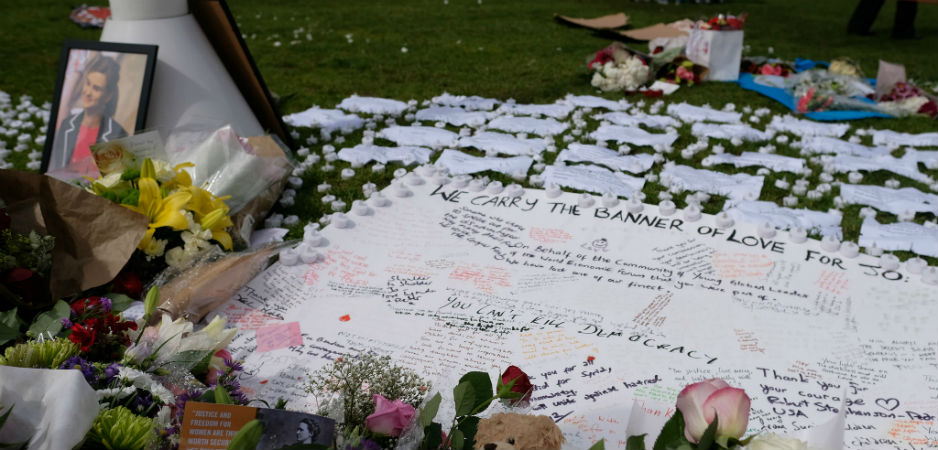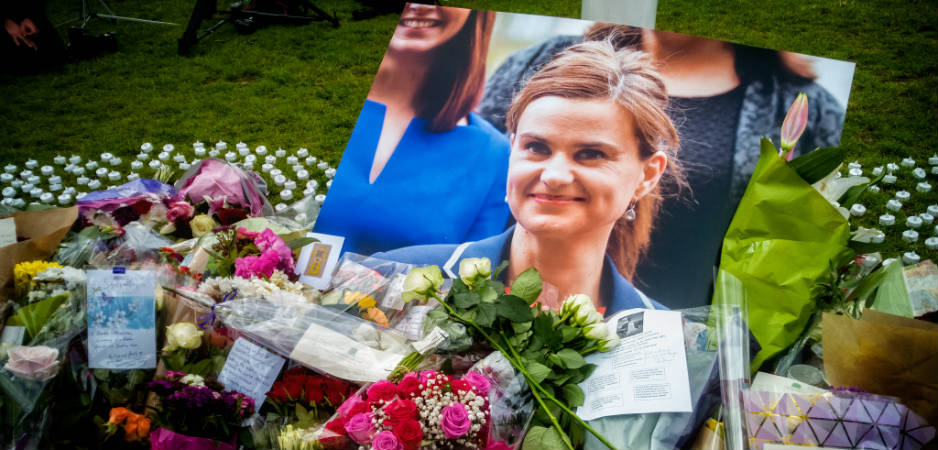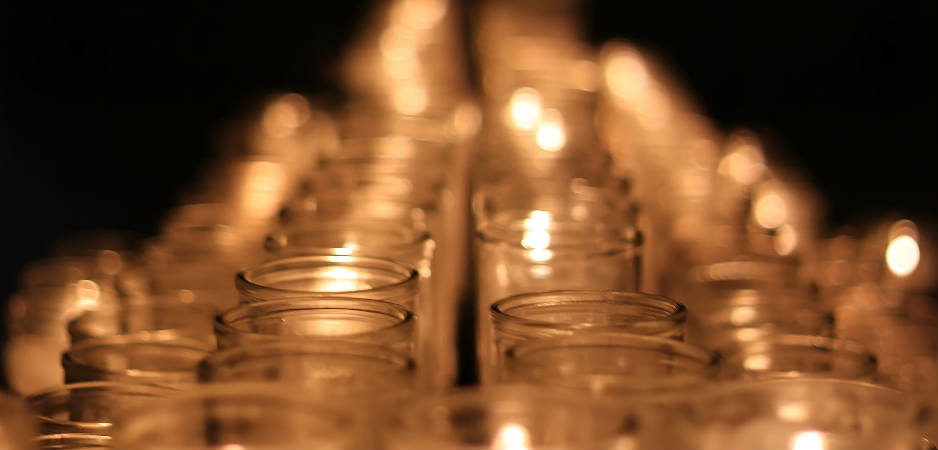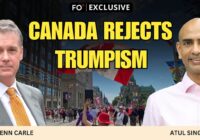The murder of Jo Cox, a respected British MP, is emblematic of increasing individual isolation, rising anger and fraying social contracts around the world.
This week, US President Barack Obama faced a rebellion from 51 of his diplomats who find fault with his Syria strategy. They want targeted military strikes against President Bashar al-Assad’s government. They argue that Obama’s current policy is not working and the Assad regime will neither observe the ceasefire nor negotiate with rebels until it is hammered hard.
In Bahrain, Nabeel Rajab, a lawyer, human rights activist and political dissident, was rearrested after less than a year of freedom. The next day, Bahraini authorities suspended all activities by the main Shia opposition group to “safeguard the security of the kingdom.” In 2011, Bahrain’s Sunni rulers crushed popular protests in a Shia majority country. Troops from neighboring Sunni-ruled allies helped put down largely Shia protesters demanding greater political rights and an end to discrimination. Clearly, the Bahraini volcano smolders on.
In recent times, violence has been largely associated with the Middle East and North Africa. After all, Muslims “fight jihad, kill non-believers, rape innocent young girls, pillage pagan temples and destroy Bamiyan Buddhas.” This is a narrative that runs strong not only in the US and Europe, but also in Kenya and India. To be fair, there is an element of truth to it. Yet to tweak the words of Hamlet, there are more things in heaven and Earth than this simplistic narrative.
Almost to prove this point, violence came home to the United Kingdom this week. Jo Cox, a 41-year-old member of parliament (MP) from the Labour Party, was brutally murdered by Thomas Mair who shouted “put Britain first” twice before shooting and stabbing her. The last time a British MP was murdered was in 1990 when the Soviet Union was still around and terrorism was a political choice of many in Northern Ireland. Since then, peace has largely reigned in the UK even though many British politicians have enthusiastically engaged in foreign military interventions from Bosnia and Sierra Leone to Iraq and Afghanistan.
Cox’s murder has shattered the domestic peace. John Major, a former British prime minister, summed up the mood of his nation by saying that Cox’s death was “particularly shocking because it is simply not what we expect in this country.” As per Major, it was “doubly shocking” because “a young lady with young children, little more than babies themselves” had been killed in cold blood. He eloquently expressed the operative question: “Is this the act of a single deranged man or is this emblematic of an angry feeling that has grown not just in our country but all of Europe?”
Mair, Cox’s murderer, appeared in court giving his name as “Death to traitors, freedom for Britain.” The Guardian reports that he had a reputation of being a “quiet, polite and reserved” chap. Mair’s half-brother is mixed race and he has no record of racism. He reportedly helped neighbors with their gardening, volunteered at a school for children with disabilities and shopped for his mother twice a week. His house is apparently full of books.
Mair seems to be an unlikely killer. He was known to wax lyrical about the benefits of volunteering. Mair promoted it as an antidote to mental problems, saying: “Many people who suffer from mental illness are socially isolated and disconnected from society, feelings of worthlessness are also common, mainly caused by long-term unemployment.” So, was Mair a deranged man as Major hopes or is there something more going on?
To answer that question, we have to look more closely at the MP that Mair killed. The Economist, no friend of the Labour Party, called Cox “idealistic, diligent, likeable and rooted in her Yorkshire constituency.” During her schooldays, she worked in a toothpaste factory and was the first person of her family to go to university, which turned out to be none other than Cambridge.
Like many commoners, she found the snooty corridors of Cambridge daunting. She called life in Parliament “a walk in the park” by comparison. After Cambridge, Cox worked for Oxfam and other charities. As an MP, she was in favor of throwing open the doors of the UK to refugees and was co-chair of the all-party Friends of Syria group. Cox was a breath of fresh air in British politics where elitist Old Etonians who have little real life experience rule the roost.
Yet Cox was running against hardening sentiment against foreigners in the UK. She was also tarred with the same brush as other politicians whom Britons, in the words of The Economist, view as “out-of-touch and self-centered at best; deceitful and crooked at worst.” Major rightly observes that “dissatisfaction with politics and hence with politicians” has been growing in Britain.
With the referendum on remaining or leaving the European Union (EU) drawing nigh, emotions are running high and tempers are starting to flare. John Major and Boris Johnson, the colorful former mayor of London, had a brutal spat not too long ago even though they belong to same party. The flotillas of Nigel Farage, the leader of United Kingdom Independence Party (UKIP), and Bob Geldof, an aging rock star, clashed on the Thames.
Both sides have their share of honorable people and callous cads. In their clash, profound ideas about politics, economics and identity are at stake. Earlier this year, this author examined how the UK and the EU have long had a troubled marriage. The English Channel may be merely a bit more than 32 kilometers at its narrowest, but it is more than a moat for a castle. This narrow strip of water has meant the history of this green and blessed isle has followed a different arc to the rest of Europe.
Hamid Dabashi points out that if Mair was named Mohammed Moustafa and cried “Allahu Akbar” then the BBC, CNN and The New York Times would be examining Islam and terrorism with great gusto.
Unlike other EU members, the UK has no memory of Nazi jackboots or Napoléon’s Grande Armée marching through its streets. Its “splendid isolation” has ensured a largely unbroken continuity of tradition, and its deep rooted institutions are the envy of much of the world. In the rest of Europe, the vast majority of existing borders and constitutions were born over a frenzied few decades.
The memory of the UK is uniquely dominated by its now lost empire. After all, this island nation ruled a fifth of the world’s surface until 1947. The country continues to have close links with the English-speaking peoples of New Zealand, Australia, Canada, the US and even the colored members of the British Commonwealth. Its common law system operates in all its former colonies and underpins global finance even today. Unsurprisingly, the UK is a little country with quite a big head.
Apart from the Great Britain syndrome of the UK, Queen Elizabeth II’s realm and the EU still retain fundamental philosophical differences that are infernally hard to reconcile. The land of Adam Smith and Jeremy Bentham is “a nation of shopkeepers” that joined the EU to trade with it. For years, the UK has seen the EU as a trading bloc, seeking to make it broader by including more nations in it. Conservative Prime Minister David Cameron is supporting Turkey’s membership of the EU just as Labour’s Tony Blair once did.
On the other hand, the EU sees itself as a supranational entity that seeks to create a new European identity. Its bureaucrats have long sought to make the EU deeper with a common currency, harmonized regulations and shared cultural symbols. Therefore, it is little surprise that Valéry Giscard d’Estaing, former French president and former president of the convention examining the constitutional future of Europe, declared that Turkey had no place in the EU because it had “a different culture, a different approach, a different way of life.”
Many Britons who love France and Europe have fallen out of love with the EU. Michael Julien, a thoughtful man of French descent, believes that democratic deficit and a bureaucratic maze now define the EU. He believes that, in the long run, the UK would be better off outside the EU because Britons would have no alternative but to innovate.
Cameron, Blair and others who want to stay in the EU argue that the UK is a small fish in a big ocean. With competition from whales like the US and China, the UK would do best to swim in the EU shoal. This would allow London to remain the financial center of the EU and Britons to move freely across the continent to work, live and trade. The International Monetary Fund (IMF), US President Barack Obama and even Chinese President Xi Jinping think that leaving the EU is a bad idea for the UK. Like Julien, they have a point too.
Yet the cads on both side of the Brexit debate are rabble-rousing. As Anna Pivovarchuk writes for Fair Observer, “misinformation, fact-bending and outright lies” have been rife. This jostling for the hearts and minds of Britons is taking place at a time when, as Major points out, most of Europe has not seen “material increase in quality of life or standard of living.” In his words, “one has to go back to the 1930s to find such a comparatively long period of economic hardship.” Inevitably, harsh feelings and some “pretty unpalatable groups” that prey on those feelings are on the rise.
Thomas Mair appears to be an insecure and isolated individual like Omar Mateen, the Afghan American who committed the recent mass shooting in Orlando, Florida. This troubled man had somehow come to believe that Cox was a traitor who was not putting “Britain first” and cared more about Syrian refugees or the EU. Like the assassins of Tsar Alexander II, Mair killed Cox for absurd political reasons.
Hamid Dabashi points out that if Mair was named Mohammed Moustafa and cried “Allahu Akbar” then the BBC, CNN and The New York Times would be examining Islam and terrorism with great gusto. They have not held UKIP and other European far-right groups to similar scrutiny. Sadly, Mair is emblematic of the rising angry feeling not only in the UK and Europe, but also in much of the rest of the world.
The Atlantic reports that Mair was a longtime supporter of the National Alliance, a US-based neo-Nazi group. As this author wrote earlier, terrorism is rising again just as in the 19th century because of increasing inequality and fraying social contracts. Far too many people have lost faith in ideas, individuals and institutions like the IMF, EU or the British Parliament. Elites have lost credibility and even honorable self-made leaders with working-class roots like Cox lose their sheen once they start working within the existing system.
In this age of cynicism when the speed and scale of change is causing new anxieties, many are retreating to religious, racial, ethnic and national identities. These troubled souls dream of a halcyon past and a utopian future. Some of them are willing to kill and to die for their imagined identities. Both Mair and Mateen found solace for their personal demons through public acts of terror. Thankfully, unlike Mateen, Mair did not have the right to buy assault rifles.
*[You can receive “The World This Week” directly in your inbox by subscribing to our mailing list. Simply visit Fair Observer and enter your email address in the space provided. Meanwhile, please find below five of our finest articles for the week.]
Orlando: The Usual and Unusual Suspects
The roots of the Orlando shootings grow deep into the fabric of American society.
The routine begins again. The media are on top of it. We know who the killer is: His name is Omar Mateen, an American born to Afghan parents. He’s dead. We know practically nothing for the moment about his relations, to whom he was talking, if anyone. The whole thing looks and feels like terrorism and has been so branded, but this is already being called a lone-wolf attack.
On one level, that makes it sound simple: one man with one motive. But the reality is much too complex for us not to begin seriously looking for other suspects or accomplices, the agents without whom this could never have happened. Even if it was a lone-wolf attack, those suspects surely exist. But the ones we’re looking for may not be identifiable human beings who can talk a killer into a crime, aid and abet… Read more
The Human Factor in the Politics of Fear
With Brexit looming amid the tragic death of a British MP, the political climate has turned ugly.
We go through our daily lives, if not exactly forgetting the cruelties of injustice and grief that exist on every corner, but cushioned in our protective bubble of optimism that helps us deal with that knowledge by giving hope in the good of the world and the people who inhabit it. But ever so often, something so devastating happens that it bursts through our shield of comfort, making the world a dark, wretched place where you search and question yourself, and all of humanity, for the purpose of it all.
The savage attack on a gay nightclub in Orlando, Florida, was one such event. The targeting of a community that to this day faces unprecedented levels of persecution and hatred, in one place where it thought itself safe and accepted, broke hearts across the world. Men, women, transgender, gay, straight, religious… Read more
The Politics of Grief After Orlando
Muslim Americans have been robbed of the ability to grieve because they have been on the defensive in the name of their religion.
The buzzing of news alerts of the Orlando massacre woke me up Sunday morning, nearly an hour before I usually wake to have my usual 3 a.m. meal before beginning my fast during this holy month of Ramadan. While at the time it was not immediately known who, or why, would massacre dozens of people gathering in celebration of Gay Pride in Orlando, Florida, it quickly became apparent that the man—29-year-old Omar Mateen—was by all accounts deranged, hateful and, as it turned out at the last minute, a sympathizer of the so-called Islamic State (IS). Once the latter point became known, it turned into the focal point of the conversation surrounding the attacks.
As a community was desperately mourning the senseless slaughter of its members, the conversation was hijacked by politicians clamoring to… Read more
A Second Insurgency in the Niger Delta
Nigeria’s government could soon see itself fighting two insurgencies, one against Boko Haram in the north and one against Biafra in the east.
Following a spate of attacks against oil pipelines in the Niger Delta, Nigerian President Muhammadu Buhari has promised to hold talks with local leaders to address their grievances. But recently-announced cuts to the amnesty program that brought an end to a previous bout of militancy in the region only serve to reinforce the view held by some that the problems in the Christian east are neglected when a northern Muslim, like Buhari, holds the presidency.
This belief has fueled a resurgent independence movement that harks back to the ill-fated Republic of Biafra that attempted to break away from Nigeria in 1967, precipitating a ruinous civil war. Unless it treads carefully, the government could see itself fighting two insurgencies: one against Boko Haram in the north and one against Biafra in the east. The latest flare-up… Read more
Defining Casablanca’s Modern City Brand
The economic powerhouse of Morocco’s Casablanca is light years away from the image created in a Hollywood studio 70 years ago.
Our story starts in 1942 with Europe in the midst of war. We find ourselves in the dusty North African outpost of Casablanca, where a motley assortment of refugees, political agitators and men with secrets gather in a place known as Rick’s Cafe. Here, they exchange news, drink whiskey and juggle illegal paperwork to get them out of the country to a better life.
Casablanca was full of anxiety and uncertainty, a limbo full of those caught between their pre-war pasts and their uncertain futures. So begins the plot of what was to become one of the most popular classic films of all time: Casablanca.
But Rick’s Café never really existed. Casablanca was not shot in Morocco. None of its actors were Moroccan. In fact, the whole thing was constructed in a Hollywood studio, making Casablanca the film… Read more
The views expressed in this article are the author’s own and do not necessarily reflect Fair Observer’s editorial policy.
Photo Credit: Alisdare Hickson
 We bring you perspectives from around the world. Help us to inform and educate. Your donation is tax-deductible. Join over 400 people to become a donor or you could choose to be a sponsor.
We bring you perspectives from around the world. Help us to inform and educate. Your donation is tax-deductible. Join over 400 people to become a donor or you could choose to be a sponsor.
Support Fair Observer
We rely on your support for our independence, diversity and quality.
For more than 10 years, Fair Observer has been free, fair and independent. No billionaire owns us, no advertisers control us. We are a reader-supported nonprofit. Unlike many other publications, we keep our content free for readers regardless of where they live or whether they can afford to pay. We have no paywalls and no ads.
In the post-truth era of fake news, echo chambers and filter bubbles, we publish a plurality of perspectives from around the world. Anyone can publish with us, but everyone goes through a rigorous editorial process. So, you get fact-checked, well-reasoned content instead of noise.
We publish 3,000+ voices from 90+ countries. We also conduct education and training programs
on subjects ranging from digital media and journalism to writing and critical thinking. This
doesn’t come cheap. Servers, editors, trainers and web developers cost
money.
Please consider supporting us on a regular basis as a recurring donor or a
sustaining member.
Will you support FO’s journalism?
We rely on your support for our independence, diversity and quality.













Commenting Guidelines
Please read our commenting guidelines before commenting.
1. Be Respectful: Please be polite to the author. Avoid hostility. The whole point of Fair Observer is openness to different perspectives from perspectives from around the world.
2. Comment Thoughtfully: Please be relevant and constructive. We do not allow personal attacks, disinformation or trolling. We will remove hate speech or incitement.
3. Contribute Usefully: Add something of value — a point of view, an argument, a personal experience or a relevant link if you are citing statistics and key facts.
Please agree to the guidelines before proceeding.